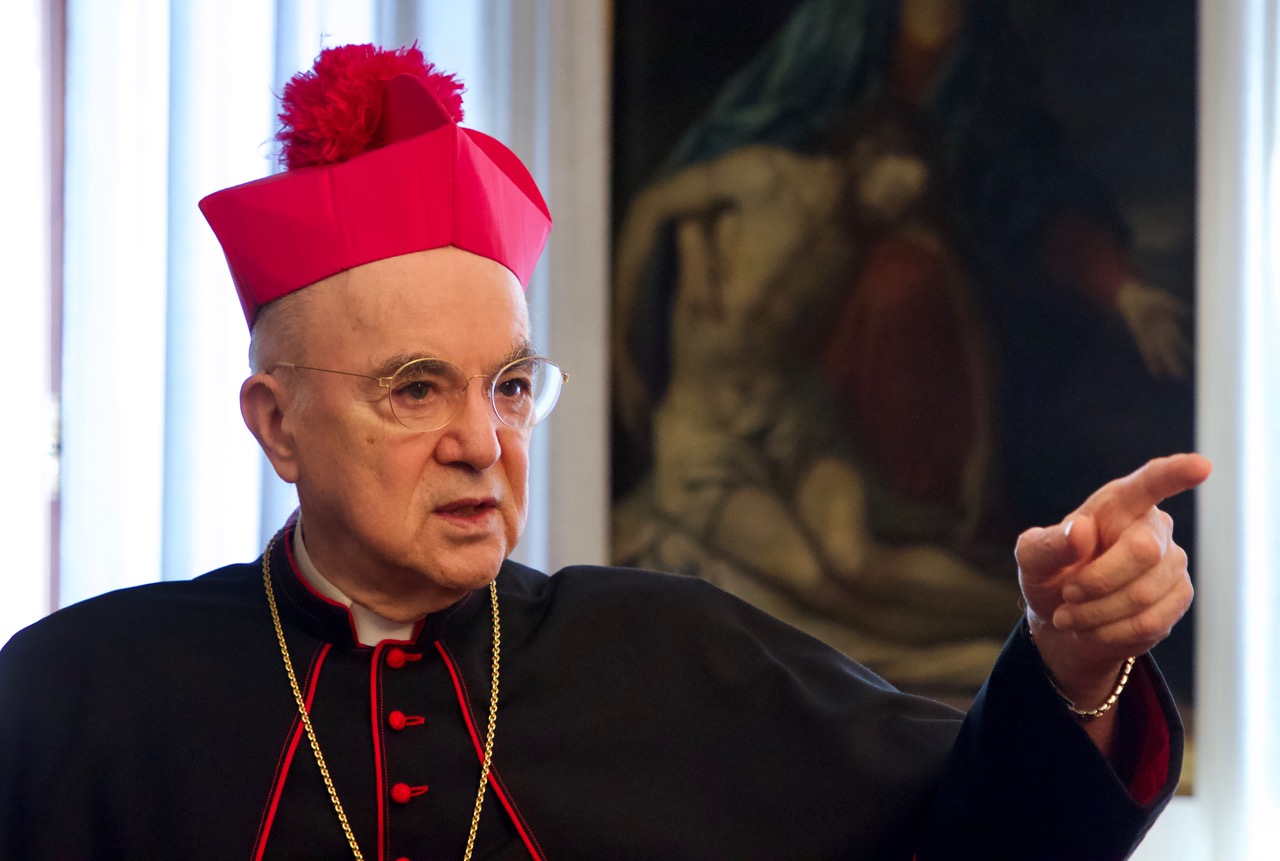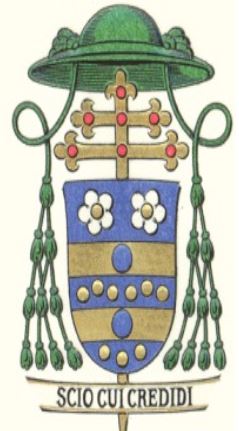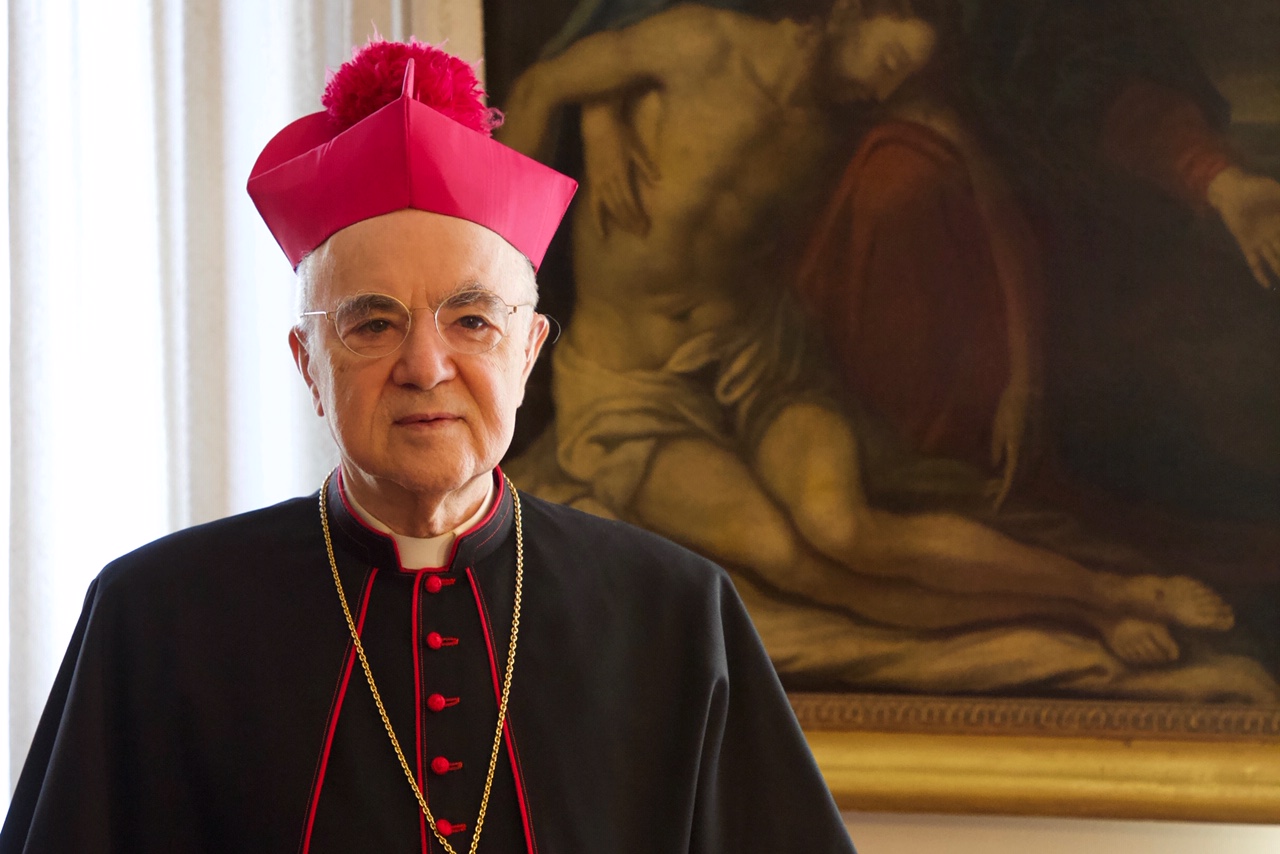Remnant Articles
November 12, 2020
RA: Your Excellency, the report claims you “did not come forward” to present evidence for this Vatican inquiry: were you asked to provide information? Did anyone reach out to you?
+CMV: I am surprised to discover that a Report in which I am mentioned 306 times accuses me of not having “come forward” to testify in this Vatican inquiry on Theodore McCarrick. But according to the norm of canon law, the calling of witnesses is the responsibility of the one who is in charge of the process, on the basis of evidence gathered in the investigation phase.
ARCHBISHOP CARLO MARIA VIGANÒ Interviewed by Raymond Arroyo
By: Press ReleaseNew from RTV...
In this Sunday Sermon from So. St. Paul, Father comments on Election Fiasco 2020, arguing that the cheating, lying and fraud going on in America today is something straight out of hell.
Father encourages his flock to pray for the president. As long as Trump is willing to fight for our nation, we must be willing to fight for him.
ELECTION FIASCO 2020: A Gift From Hell Below Us
By: Michael J. Matt | Editor
Today the official Report of the Holy See regarding the McCarrick case has been made public. Before I express myself on its merit, I will take time to analyze its content.
However, I cannot fail to note the surreal operation of mystification regarding who are the ones responsible for covering up the scandals of the deposed American cardinal, and at the same time I cannot help expressing my indignation in seeing the same accusations of cover up being made against me, when in fact I repeatedly denounced the inaction of the Holy See in the face of the gravity of the accusations concerning McCarrick’s conduct.
Viganò on the McCarrick Report: "The Vatican fiction continues."
By: + Carlo Maria Viganò, ArchbishopNew From Archbishop Viganò...
Viganò on Biden, the American Bishops, Fr. James Martin & Other Occupants of the Castle of Falsehoods
By: + Carlo Maria Viganò, ArchbishopNew from Remnant TV... In this late-night edition of The Editor's Desk, Michael J. Matt offers post-election day commentary on the vote, the cheating and the larger victory they can never take away from Trump...or from us.
In this late-night edition of The Editor's Desk, Michael J. Matt offers post-election day commentary on the vote, the cheating and the larger victory they can never take away from Trump...or from us.
Dear Brothers and Sisters,
As devout Christians and faithful citizens of the United States of America, you have intense and heartfelt concern for the fate of your beloved country while the final results of the Presidential election are still uncertain.
News of electoral fraud is multiplying, despite the shameful attempts of the mainstream media to censor the truth of the facts in order to give their candidate the advantage. There are states in which the number of votes is greater than the number of voters; others in which the mail-in vote seems to be exclusively in favor of Joe Biden; others in which the counting of ballots has been suspended for no reason or where sensational tampering has been discovered: always and only against President Donald J. Trump, always and only in favor of Biden.
MESSAGE OF ARCHBISHOP CARLO MARIA VIGANÒ TO AMERICAN CATHOLICS AND TO ALL AMERICANS OF GOOD WILL
By: + Carlo Maria Viganò, ArchbishopNew from RTV (Videos to see before Election Day!)
On the eve of the most important election in U.S. history, Joe Biden is campaigning on your fear of COVID, arguing that Donald Trump risked our lives by botching the response to the pandemic.
Well, Europe has been under harsh lockdowns and mandatory mask mandates for months. The French have not been allowed to travel more than a certain distance from their homes. They have mask mandates even outside, with heavy fines for failure to comply.
And now it is starting all over again.
EVACUATING PARIS: Thousands Flee New COVID Lockdowns
By: Michael J. Matt | EditorNew from Remnant TV...
From the Editor's Desk, Michael Matt takes one last look at the U.S. 2020 presidential election:
- Are the polls wrong again?
- Can Trump pull it off again?
- Why is Bill Gates pointing to a second pandemic?
- Why is Dr. Fauci predicting COVID restrictions through 2022?
- What about Vatican interference in the U.S. election?
- What issue prompted the Trump team to invite The Remnant on a Press Call?
- Did Steve Bannon just out himself as a traditional Catholic?
- Monsignor Charles Pope has fully recovered from COVID? Now, what?
- What happens if Donald Trump loses next Tuesday?
COUNTDOWN to D-DAY 2020: America on the Brink
By: Michael J. Matt | EditorNew from Remnant TV...
Sunday, October 25, 2020
Solemnity of Christ the King

Allow me to address you at this hour in which the fate of the whole world is being threatened by a global conspiracy against God and humanity. I write to you as an Archbishop, as a Successor of the Apostles, as the former Apostolic Nuncio to the United States of America. I am writing to you in the midst of the silence of both civil and religious authorities. May you accept these words of mine as the “voice of one crying out in the desert” (Jn 1:23).
As I said when I wrote my letter to you in June, this historical moment sees the forces of Evil aligned in a battle without quarter against the forces of Good; forces of Evil that appear powerful and organized as they oppose the children of Light, who are disoriented and disorganized, abandoned by their temporal and spiritual leaders.
FINAL COUNTDOWN: Viganò's Urgent Letter to Trump Before Election 2020
By: + Carlo Maria ViganòArchbishop Viganò makes his first on-camera appearance in two years, addressing the crisis in the Catholic Church and specifically the connection between Vatican II and the revolution of Pope Francis (transcript of entire talk appears below the video).
Archbishop Viganò Addresses the Catholic Identity Conference 2020 (Francis & the New World Order)
By: Michael J. Matt | Editor
- The Second Wave is here.
- The Great Reset is on.
- Pope Francis goes all in on Communist China and the U.N.'s Agenda 2030.
- The one and only Catholic conference of 2020 brings together powerful voices from all over the world to answer the question: What now?
Michael Matt hosts the Catholic Identity Conference, which is not going to let COVID shut us down.
Join the Conference via LIVE VIDEO FEED.





